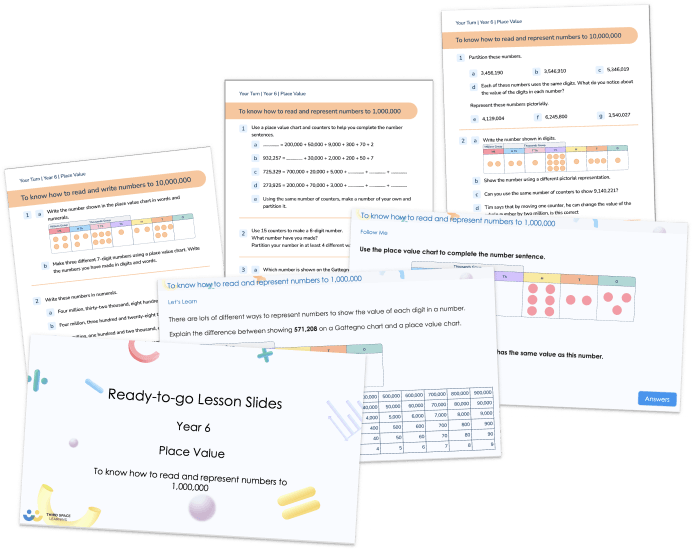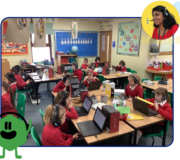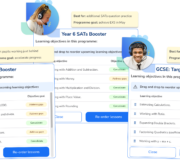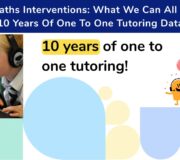How Our New And Improved Lesson Slides Can Support Your Catch Up Teaching
Our ready-to-go-lesson slides based around the White Rose scheme are used by thousands of teachers in thousands of schools every week. Teachers have told us they love them, and they’ve also, even more helpfully, given us feedback about how we could improve them.
We’ve spent the past 3 months reviewing the lessons slides with the help of teachers and our own educational experts at Third Space with the aim of making them even better.
This article gives you some insight into what changes you can expect, and why we’re making them. Having trained over 1,500 specialist maths tutors and taught over 750,000 online 1-to-1 lessons to primary school pupils in the last 6 years, our expertise lies in delivering a mastery curriculum and adjusting it to suit the specific needs of all the pupils we support.
We know that the best teachers are constantly adapting the pitch, pace and level of challenge in their classrooms in the same way. We want to ensure that our resources can help you to do this.
A quick summary of what you can expect from our lesson slides in September:
- clearly structured and impactful lessons
- well thought out group and individual tasks that are flexible enough for you to adapt and adjust easily to suit your class
- detailed teaching guidance for every lesson if you choose to use it.
White Rose Autumn Block 1 Lesson Slides – Place Value
Free taster of white rose autumn block 1 and other maths mastery schemes for years 1 to 6. Includes teaching notes.
Download Free Now!Supporting teachers to do what they do best
There is value in implementing a prescriptive school-wide scheme of work; consistent teaching methods, strategies and carefully planned progression across the years are part of the recipe for success – but teachers tell us that some schemes can prove too restrictive, and too costly.
Most schemes cost thousands per year whilst our library of resources and CPD starts at £390 per year (or free if your school is using our 1-to-1 catch up interventions). We know from speaking to hundreds of teachers and maths leaders every week, that you are busy adapting and adjusting your lessons to suit your pupils.
We have therefore identified a number of changes which we hope will better support you in this approach, saving you time and allowing you to more easily support or stretch your pupils where appropriate, especially with the return to school following closures:
- We’re adding new support slides to every lesson – supporting AfL informed immediate intervention
- For the first time from Third Space – printable worksheets to go with every single lesson!
- Supporting more assessment for learning
- Easier to navigate and find what you need
- Teaching notes and suggested questions – great for NQTs and RQTs
- More sentence stems and vocabulary
- Improved variation of questions
- The answers you know and love but fewer slides
- Making our lesson slides dyslexia friendly
- New teacher guides to support implementation
Whether you are teaching a recovery curriculum, or treating next year as you would any other year, we will equip you with the resources and tools to teach brilliant mastery focused lessons.
You can combine this with other Third Space resources such as Fluent in Five, Rapid Reasoning, our pre- and post-diagnostic assessments, code crackers, ready to go worksheets, and on demand CPD to create a maths scheme personalised for your school. All the benefits of a school-wide scheme of work without the restrictive requirements (or large ongoing costs) that other schemes provide.
Resources to support your catch up plans
With pupils having missed up to four months of in-class teaching, the need to deliver responsive teaching based on assessment of pupils’ understanding is clear.
What’s also clear is that there is no universal approach to providing this kind of catch up support for your pupils. You may decide to begin the new academic year by teaching content missed during school closures, or to focus on topics that you know your pupils in particular are struggling with, or to provide additional maths lessons to make time to cover missed content.
Where possible, we strongly recommend making use of teachers’ experience and expertise in assessment for learning. Rather than spending time going over missed content, we believe it will be more efficient to start the term in the same way you would any autumn term and use AfL to assess and identify gaps as you teach. In this way, you will be able to adapt your teaching and address gaps as they arise.
This is the approach that makes our online 1-to-1 catch up programmes so successful.
Lessons are chosen specifically to plug each pupils’ individual gaps meaning pupils progress through the programme and catch up in maths in the way that suits them best. Our specialist KS2 tutors ensure a fully personalised learning experience by adapting the pitch and pace of the lesson to suit each pupil. Because the lessons are 1-to-1, they can easily identify and address misconceptions as they arise. This means pupils receive effective, targeted support to catch up in maths as quickly (and confidently!) as possible.
We’re adding new support slides to every lesson – supporting AfL informed immediate intervention
We’re keeping our curriculum aligned with the blocks and small steps that you would usually be teaching if following the White Rose Curriculum. However, in every lesson, you’ll find an additional section of slides and suggested tasks included, which have been carefully selected to address gaps which may come up due to lost learning time. These are being provided in a format which makes them easy to use as either whole class, group or independent tasks, as you best see fit.
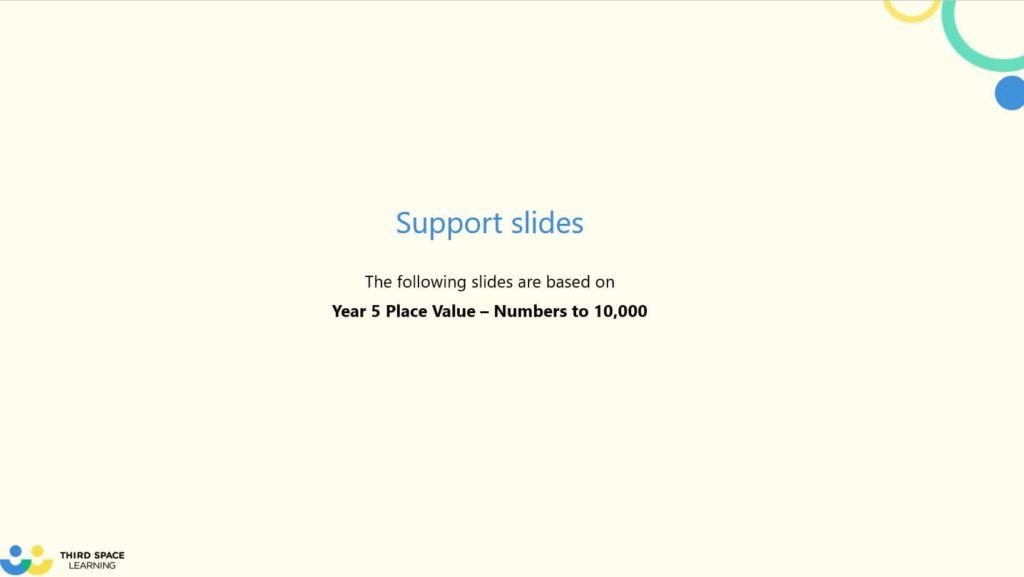
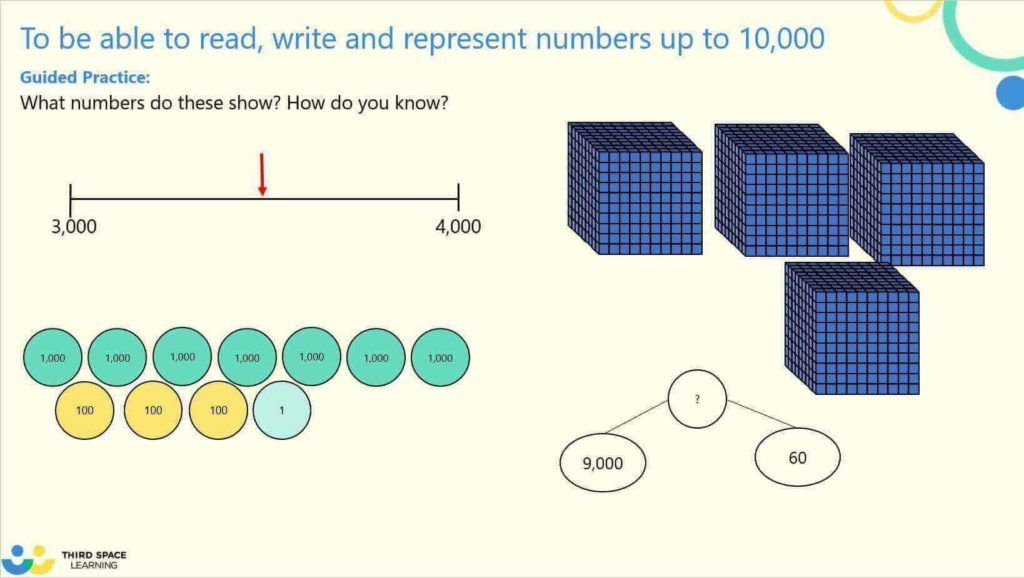
These will not simply be duplicates of content from earlier year groups. Pupils in Year 6 will have done the content from place value in Year 5 already and we know many eagle-eyed pupils would be quick to point out they’ve done a question before! Instead, it will consist of original examples and questions, being written by our expert team right now.
We’re working hard to do this in order to save you time. Of course, there may be instances where you do want to spend time on a whole lesson from this year, but where you don’t, you’ll have teaching slides and questions at your fingertips, ready to support the pupils who need it as quickly as possible. We hope this will save you valuable time searching and finding appropriate related lessons and questions, freeing up more time for you to spend planning and preparing how you’ll teach and assess.
For the first time from Third Space – printable worksheets to go with every single lesson!
We know it can be frustrating to find the ideal presentation that you want to use in a lesson, but then still have to spend time writing up linked questions for pupils to answer independently.
If you’ve been enjoying using our Independent Recap worksheets during school closures, you’ll be excited to hear that we’ll now be creating and sharing independent task worksheets for pupils to use in every single one of our ready-to-go lessons. They really will be ready to go as you will now be able to download these alongside the lesson slides.
These have been designed to support the structure of the lesson – providing tasks that pupils can carry out once you’ve gone through some modelled and guided examples together. You can then use these for pupils to try and apply the maths they’ve been learning independently, and as an opportunity for you to live mark and assess understanding.
They will take the format of a worksheet with two to three sections with a range of fluency, reasoning and problem solving questions or suggested practical activities, where appropriate. These will be carefully linked to the lesson content but not simply a duplication of what’s on the board.
Supporting more assessment for learning
From September our lessons will also include specific activities to support teachers in using AfL. As we’ve seen, being able to identify and address gaps as quickly as possible will be key to catching up in the new school year and we want to help you do that.
Each lesson will have a recommended point where we’d suggest you check in with pupils on their understanding of a key topic. Of course, we know that the best teachers are already doing this throughout the lesson anyway, but including an explicit moment to do this acts as a reminder, and we’ve ensured that it’s linked to the most important parts of the lesson or common misconceptions that frequently arise.
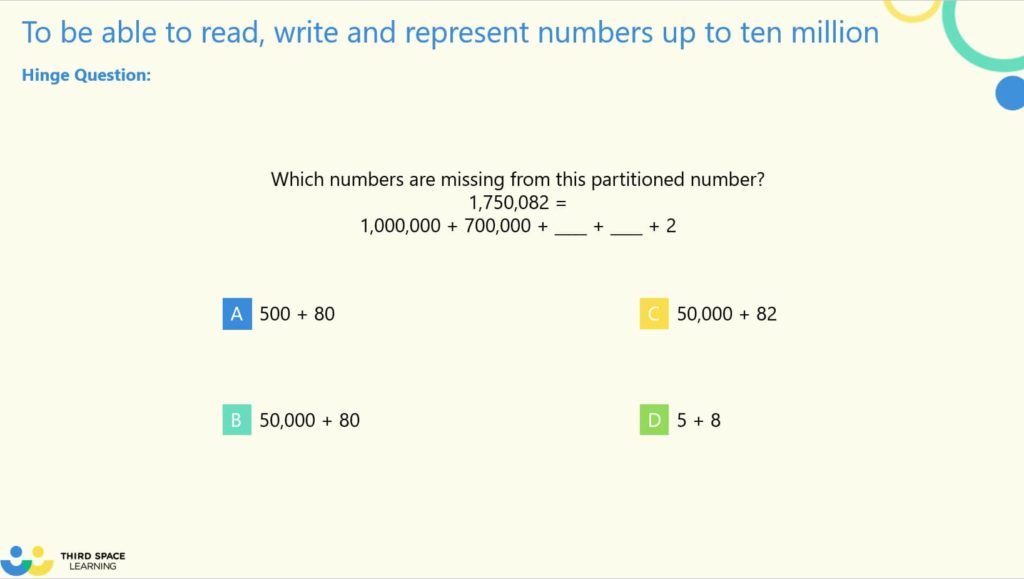
These hinge questions will also come with suggested follow up teaching ideas to support the pupils who you identify as needing more support.
Easier to navigate and find what you need
We know that one of the reasons it can sometimes feel easier to make your own slides, even though it eats into your limited time, is that you then know exactly what’s included. There’s no time needed to familiarise yourself with the tasks, structure and find the parts that you do or don’t want to use. Yet, you know you’ve got so much on that you’d rather not reinvent the wheel and make a lesson that thousands of other teachers are making.
So, to make it easier and quicker for you to pick up our lesson slides and quickly integrate them into your planning and teaching, every one of our lessons will now come with a summary at the start, giving you a clear overview of what’s included with clickable links to jump to each relevant part in the slides. Easily navigate to, review and edit tasks as you like, or quickly spot parts you think your pupils could skip.
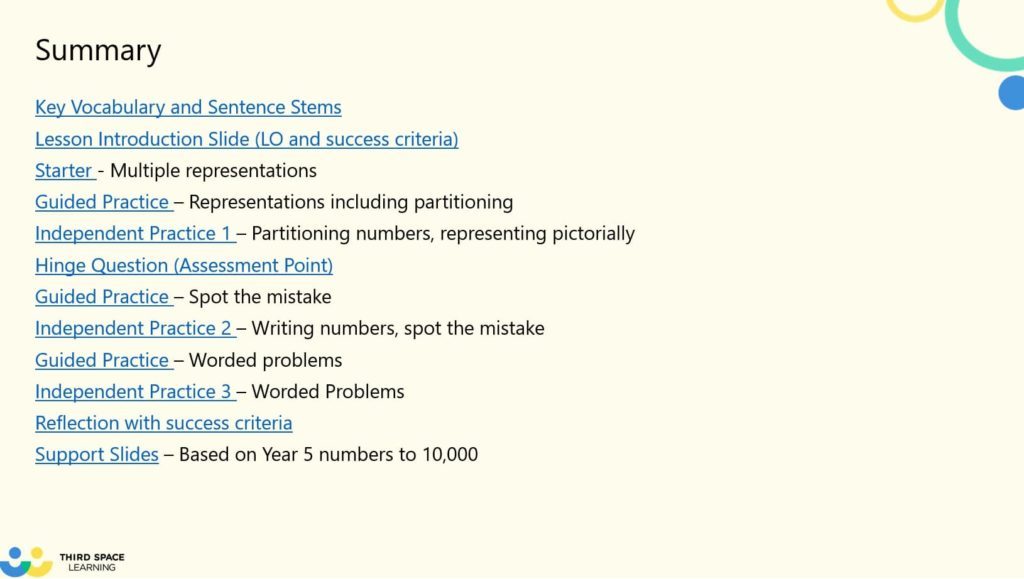
This summary also acts as an overview of the plan for the lesson. We really don’t think there’s any need to have a whole page of A4 setting out what you should do in the lesson. It’s not a good use of your time and we’re fully on board with the shift away from separate written up (or printed!) lesson plans. We know you don’t have time to read through sheets of detailed notes, you just want to quickly understand what the lesson covers and get on with adjusting it for your learners if needed.
Teaching notes and suggested questions – great for NQTs and RQTs
Whilst we’re not providing a separate lesson plan, we are making the notes accompanying each slide even more comprehensive. So if you do want some guidance on recommended ways to tackle each task in the lesson you can simply refer to the notes section of the powerpoint.
There you’ll find a range of quick to digest tips, including recommended activities for concrete resources, highlighted key questions to draw out pupil understanding, and tips for stretching and extending the learning.
If you have any NQTs, RQTs, or TAs in September, it’s also worth sharing our dedicated professional development section of the Maths Hub with them. It is the home to hundreds of bitesize CPD videos which are great for keeping up to date with modern teaching practices, or as a quick refresher before teaching a topic.
More sentence stems and vocabulary
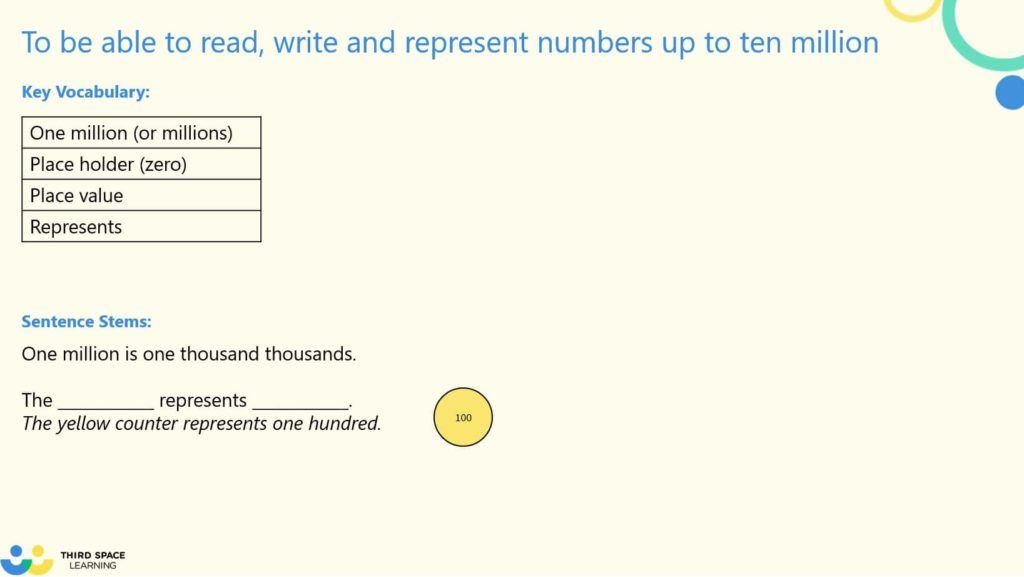
We love sentence stems! We know how valuable they can be in supporting pupils’ understanding of concepts and encouraging them to explore, talk about maths and make connections. They’re a key part of our online 1-to-1 interventions too.
We’re adding relevant sentence stems to all of our lessons from September. We’ll provide examples and ways to use variations of the sentence stem with your class where appropriate. To align these with our CPA approach they’ll also be accompanied by visual representations to help reinforce the concepts.
What’s more, we’ll provide you with a clear list of key vocabulary that is relevant to the lesson. This list is designed to be used as you wish. We know that some teachers will like to introduce the vocabulary explicitly with your pupils at the start of a lesson, others will like to explore it throughout, or print it out and have it on your working wall as you work through a block.
Improved variation of questions
As part of our team’s work over the next few months, we will be reviewing all the questions in our lesson slides, and ensuring that they are aligned with what we know are the best ways to support pupils in learning – that they use carefully thought through variation and progression to help pupils make connections, spot patterns and apply their learning.
For example, instead of providing a question for pupils to answer, they may be given a question that has an answer. This will encourage the pupils to discuss the accuracy of the answer and possible methods that could be used to find the answer.
The answers you know and love but fewer slides
At Third Space Learning one of the things we know teachers appreciate about our high quality resources is that they always come with the answers included and detailed mark schemes where appropriate.
Our lesson slides already have answers, but they are on a separate slide for every question. We don’t want you to have to scroll through endless slides, and we recognise that some of you may well not want to use the answers on the board anyway. To be honest, if you’re modelling in the lesson, we’d rather you were reaching the answers live with your class, or getting the pupils to explain their thinking to reach an answer….but we know there are always days when you need to double check answers.
We’ll still be including them but they will be moved onto the same slide as the questions rather than on a duplicated slide. You can then easily choose to reveal them or delete them as you wish, and there’s no need to keep skipping past duplicated slides as you teach, or spend time deleting/moving them.
Making our lesson slides dyslexia friendly
We’ll put our hands up on this one and admit that unfortunately our current design isn’t as well suited as it could be to dyslexic pupils. We’re exploring the best ways to make our content as accessible as possible for all pupils.
We’ll be changing the background and fonts of our slides to a more suitable colour combination and making sure that wherever possible the font, text weight and spacing means that the content is easier for all pupils to access.
New teacher guides to support implementation
Planning on using our resources for the first time? We’ll be providing teacher guides for each year group as well as presentations and further documentation to use with staff to ensure they know how to implement best practice in class. As with any new resource, implementation, training and clarity with staff is vital, so these teacher guides should make using our new slides super easy.
What else is staying?
On top of all of these improvements our lessons will continue to have the following
- Aligned with WRM learning objectives
- Clear learning objective on every page
- Success criteria for review at start and end of lesson
- Starter activity
- A me, we, you (modelled, guided, independent practice) approach
- Plenty of real world examples
- Opportunities for reasoning and problem solving
- Partner talk activities
- Pictorial representations to support concepts (for KS1 & KS2)
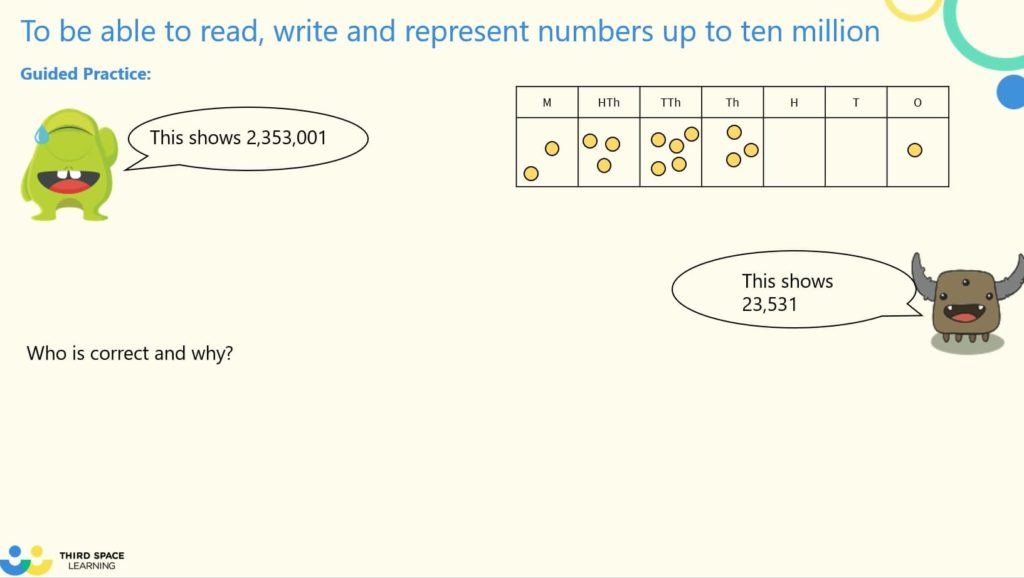
Great news – you’ll be able to try some of the slides for free
In September, we’ll be sharing lots of the place value block for free, so you can start using them the first week back, and demonstrate their effectiveness to senior leaders. Register for a free account to start using all our free maths resources ahead of September before committing to a premium school subscription.
Our lesson slides are normally part of our premium school resource subscription, or included for free alongside our 1-to-1 interventions. If your school isn’t already a Maths Hub subscriber, it is the lowest priced whole-school subscription which includes an entire mastery lesson curriculum, Fluent in Five, Rapid Reasoning, diagnostic assessment, worksheets, on demand CPD, and everything else that you might possibly require.
DO YOU HAVE STUDENTS WHO NEED MORE SUPPORT IN MATHS?
Every week Third Space Learning’s maths specialist tutors support thousands of students across hundreds of schools with weekly online maths tuition designed to plug gaps and boost progress.
Since 2013 these personalised one to one lessons have helped over 150,000 primary and secondary students become more confident, able mathematicians.
Learn about our experience with schools or request a personalised quote for your school to speak to us about your school’s needs and how we can help.

